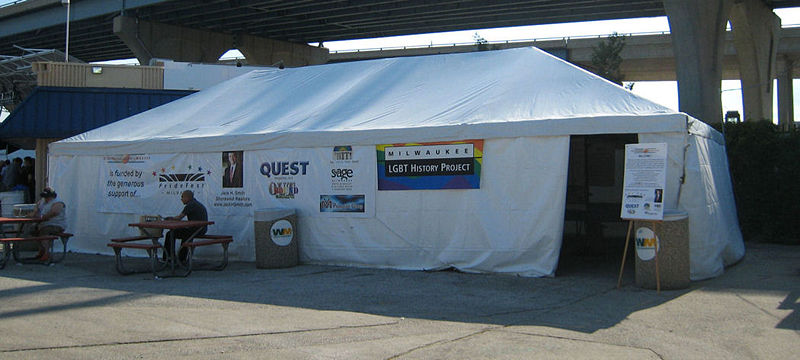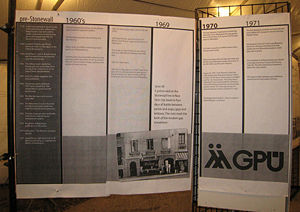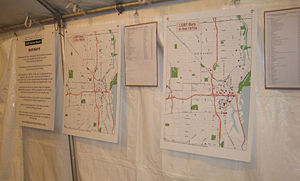Difference between revisions of "WisLGBT Sidebar: PrideFest History displays"
(New page: '''Wisconsin LGBT History SIDEBAR''' == Milwaukee's PrideFest History Displays == The History Display at PrideFest 2009, called "Stonewall40Milwaukee", was held in a 20x40' tent strategi...) |
|||
| (3 intermediate revisions by the same user not shown) | |||
| Line 4: | Line 4: | ||
The History Display at PrideFest 2009, called "Stonewall40Milwaukee", was held in a 20x40' tent strategically located between the main entrance of PrideFest and the Miller Stage. The display featured three major components: | The History Display at PrideFest 2009, called "Stonewall40Milwaukee", was held in a 20x40' tent strategically located between the main entrance of PrideFest and the Miller Stage. The display featured three major components: | ||
| − | + | ||
| − | Image:Stonewall40milw-logo.jpg| | + | [[Image:Stonewall40milw-logo.jpg||center|2009 Exhibit logo]] |
| − | Image:tent-outside_3013-c.jpg| | + | [[Image:tent-outside_3013-c.jpg|800px|center|View of tent housing the display]] |
| − | |||
===Interactive Timeline=== | ===Interactive Timeline=== | ||
| − | [[Image:timeline-69-71_3006-c.jpg| | + | [[Image:timeline-69-71_3006-c.jpg|300px|right|]] |
The Interactive Timeline is a decade by decade, year-by-year timeline of major events in the LGBT history of Milwaukee and Wisconsin, juxtaposed with some major national events. As with the first Timeline display in 2005, people were able to read existing entries, and add their own recollections and comments in given year blocks. | The Interactive Timeline is a decade by decade, year-by-year timeline of major events in the LGBT history of Milwaukee and Wisconsin, juxtaposed with some major national events. As with the first Timeline display in 2005, people were able to read existing entries, and add their own recollections and comments in given year blocks. | ||
* View the Milwaukee "Since Stonewall" LGBT Timeline: [[Milwaukee Since Stonewall LGBT Timeline]] | * View the Milwaukee "Since Stonewall" LGBT Timeline: [[Milwaukee Since Stonewall LGBT Timeline]] | ||
| − | |||
| − | |||
| − | |||
| − | |||
| − | |||
===Video Presentation: "Some Call Them Gay"=== | ===Video Presentation: "Some Call Them Gay"=== | ||
| Line 24: | Line 18: | ||
From September 24 to 28, 1973, television station WTMJ-TV in Milwaukee broadcast a five-part series on the city’s gay and lesbian community. The series, shown during the noon and 10 p.m. newscasts, was titled “Some Call Them Gay.” The relatively unprejudiced and objective representation of gay men and lesbians was remarkable for mass media of this period. The Milwaukee Press Club recognized “Some Call Them Gay” as the Best Television Documentary or Series of 1973 and praised “the quality of reporting and the sensitivity used on a subject so controversial in nature.” All five segments were played on a large screen TV inside the display area throughout the weekend. The footage was culled from the news film archives of WTMJ-TV, which is administered by the Archives Department at the University of Wisconsin--Milwaukee. | From September 24 to 28, 1973, television station WTMJ-TV in Milwaukee broadcast a five-part series on the city’s gay and lesbian community. The series, shown during the noon and 10 p.m. newscasts, was titled “Some Call Them Gay.” The relatively unprejudiced and objective representation of gay men and lesbians was remarkable for mass media of this period. The Milwaukee Press Club recognized “Some Call Them Gay” as the Best Television Documentary or Series of 1973 and praised “the quality of reporting and the sensitivity used on a subject so controversial in nature.” All five segments were played on a large screen TV inside the display area throughout the weekend. The footage was culled from the news film archives of WTMJ-TV, which is administered by the Archives Department at the University of Wisconsin--Milwaukee. | ||
<ref>Information from and video preserved and made available by the Archives Department at the University of Wisconsin--Milwaukee</ref> | <ref>Information from and video preserved and made available by the Archives Department at the University of Wisconsin--Milwaukee</ref> | ||
| + | |||
| + | [[Image:barmaps-60s70s_2989-c.jpg|300px|right|]] | ||
| + | ===Bar Maps=== | ||
| + | |||
| + | Five maps were presented, showing the locations of LGBT bars in Milwaukee each of the past 5 decades: the 1960s, 1970s, 1980s, 1990s, and 2000s. Each map wasaccompanied by a list of bars shown on that map, and a master list of all bars known to have exist over the past 45 years, listed alphabetically, was also available. | ||
*Return to INTRO page: [[Wisconsin LGBT History Project- Intro]] | *Return to INTRO page: [[Wisconsin LGBT History Project- Intro]] | ||
Latest revision as of 19:07, 17 March 2010
Wisconsin LGBT History SIDEBAR
Milwaukee's PrideFest History Displays
The History Display at PrideFest 2009, called "Stonewall40Milwaukee", was held in a 20x40' tent strategically located between the main entrance of PrideFest and the Miller Stage. The display featured three major components:
Interactive Timeline
The Interactive Timeline is a decade by decade, year-by-year timeline of major events in the LGBT history of Milwaukee and Wisconsin, juxtaposed with some major national events. As with the first Timeline display in 2005, people were able to read existing entries, and add their own recollections and comments in given year blocks.
- View the Milwaukee "Since Stonewall" LGBT Timeline: Milwaukee Since Stonewall LGBT Timeline
Video Presentation: "Some Call Them Gay"
From September 24 to 28, 1973, television station WTMJ-TV in Milwaukee broadcast a five-part series on the city’s gay and lesbian community. The series, shown during the noon and 10 p.m. newscasts, was titled “Some Call Them Gay.” The relatively unprejudiced and objective representation of gay men and lesbians was remarkable for mass media of this period. The Milwaukee Press Club recognized “Some Call Them Gay” as the Best Television Documentary or Series of 1973 and praised “the quality of reporting and the sensitivity used on a subject so controversial in nature.” All five segments were played on a large screen TV inside the display area throughout the weekend. The footage was culled from the news film archives of WTMJ-TV, which is administered by the Archives Department at the University of Wisconsin--Milwaukee. [1]
Bar Maps
Five maps were presented, showing the locations of LGBT bars in Milwaukee each of the past 5 decades: the 1960s, 1970s, 1980s, 1990s, and 2000s. Each map wasaccompanied by a list of bars shown on that map, and a master list of all bars known to have exist over the past 45 years, listed alphabetically, was also available.
- Return to INTRO page: Wisconsin LGBT History Project- Intro
Explore the full web site documenting GLBT life in Milwaukee, Madison, Green Bay, and all of Wisconsin at: http://www.WisconsinGayHistory.org
References
- ↑ Information from and video preserved and made available by the Archives Department at the University of Wisconsin--Milwaukee
Source: unless otherwise noted, all contents of this page copyrighted by Don Schwamb of the Wisconsin LGBT History Project.



